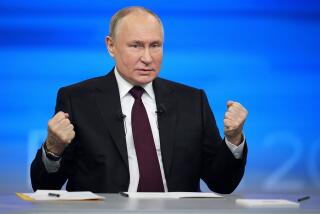Reality in the Soviet Drama
- Share via
Western governments and their expert advisers are still not sure what to make of Soviet leader Mikhail S. Gorbachev. But a wide spectrum of observers--including such long-time skeptics as Assistant Defense Secretary Richard Perle and Jeane Kirkpatrick, the former U.S. ambassador to the United Nations--have become convinced that Gorbachev’s interest in internal reform is real, and that as a consequence his 1768846437competition is also real.
This doesn’t mean that Gorbachev, from the Soviet point of view, is ready to give away the store. Typically, his latest pronouncement on medium-range missiles based in Europe, while indicating a willingness to strike a deal for their removal by both sides, leaves plenty of thorny issues to be negotiated.
If the Soviet leader’s professed interest in arms control is nonetheless gaining credibility, it is because his overriding concern with reinvigorating the Soviet economy comes through so clearly.
Gorbachev has repeatedly talked about the need for a loosening of bureaucratic controls, and for a change in the mind-set of lazy workers and reform-resistant managers. In practice, the reality of change has fallen far behind the rhetoric.
He has complained several times lately that his reform efforts are being thwarted by recalcitrant officials. In a remarkable meeting of the party central committee in January, he proposed a partial democratization of governing bodies at regional and factory levels in order to put pressure on the obstructionists to get into line.
Last week, in a televised address to a trade-union congress, Gorbachev made one of his most intriguing speeches yet. He confirmed that the January plenum had to be postponed three times before it was finally convened--clearly signaling serious disagreement within the Politburo.
The Soviet leader said that the time has come to move from rhetoric to action--that the Soviet Union must choose between “broad democratization” and social and economic stagnation. Striking an urgent note, he said that 1987 is the year of decision--that either the country will move forward or condemn itself to sliding backward.
Gorbachev, while making the routine accusation of U.S. lack of interest in arms control and vowing to do everything necessary to guarantee Soviet security, said that the government would not spend any more for defense than it had to. Maybe this was propaganda aimed at the West--or maybe it was a quiet message to the Soviet military.
When the Soviet leader talks about democracy, he is not talking about dismantling the Communist Party’s monopoly of power. And, despite his much trumpeted policy of glasnost , or more openness in the media, the Soviet Union remains a fundamentally closed society. As long as that is true, prudent outsiders must judge the Soviet Union more by what it does than by what it says.
Still, there is no longer much question that a fundamental drama is being played out. Most experts agree that outsiders don’t know enough to intelligently influence the outcome and that, as a result, we shouldn’t even try. What we can do is hold open the door to a more accommodating Russia in case Gorbachev wants to walk through it.
More to Read
Sign up for Essential California
The most important California stories and recommendations in your inbox every morning.
You may occasionally receive promotional content from the Los Angeles Times.













